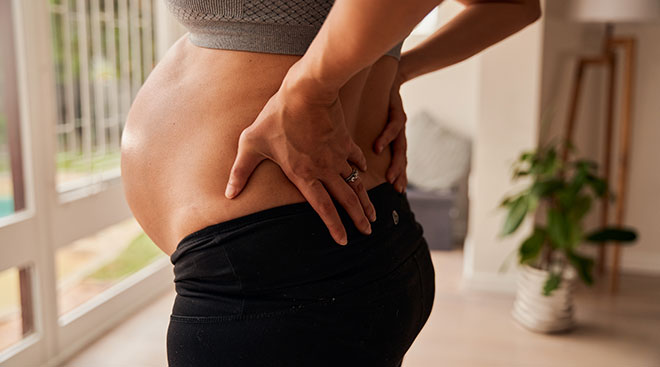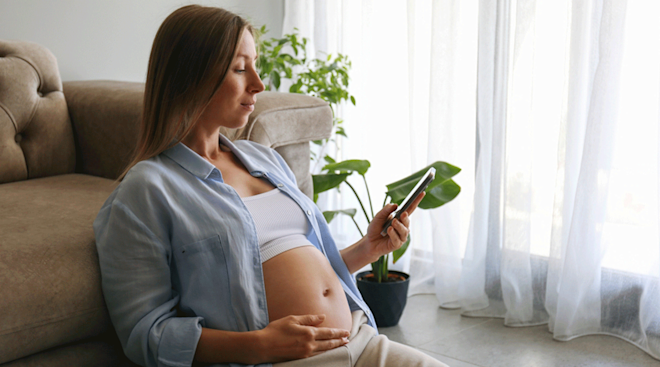How to Relieve Back Pain in Pregnancy
From start to finish, pregnancy comes with its fair share of aches, pains and general discomforts. While many of these unpleasantries are relatively easy to cope with, others can range from mildly distressing to borderline debilitating. Back pain in pregnancy is one of the more common complaints—and it can be tolerable for some and agonizing for others.
If you’re dealing with back pain in pregnancy, the reassuring news is that you’re not alone. Of course, “pain” is a relative term, and it can be tough to know what’s normal—and what’s not. Want to know when back pain may start in pregnancy, and how to get relief if and when it rears its ugly head? Here’s a breakdown of what to expect.
Back pain can actually start at the very beginning of your pregnancy. Still, while back pain can be a sign of early pregnancy, it’s not one of the most common first-trimester symptoms, says Krishna Shah, MD, assistant professor of anesthesiology-interventional pain medicine at Baylor College of Medicine in Houston, Texas. He points out that you’re more likely to be tipped off by symptoms like a missed period, nausea, swollen breasts and fatigue.
What’s more, in early pregnancy, you’ll probably experience more general achiness in your lower back rather than full-on pain, explains Christine Greves, MD, an ob-gyn at the Winnie Palmer Hospital for Women & Babies in Orlando. She also emphasizes that there are many things that can cause back pain besides pregnancy; to that end, you’ll want to take stock of any other physical symptoms. (And, of course, a pregnancy test can give you the definitive answer you’re looking for.)
If you’re wondering when back pain may start in pregnancy, the answer is: it depends. “There’s no set time when you’ll experience back pain, if you do at all,” Greves says. “Everyone’s activity levels and history of back pain and injury are different.” Of course, if you’re prone to back pain or have a previous injury, it may be more likely to pop up when you’re expecting—and it can happen at any time during those nine+ months.
In general, though, back pain in pregnancy is more likely to occur as your bump gets bigger and starts putting more pressure on your back muscles, says Greves. In other words, you may notice it in the second or third trimester.
In addition to back pain during pregnancy, you may also experience sciatica pain. This is simply a nerve pain that typically starts in the buttocks (or lower back) and radiates down one leg, explains Julie Lamppa, APRN, CNM, a certified nurse-midwife at the Mayo Clinic and the author of Obstetricks.
Back pain in pregnancy can be caused by a number of things: a previous injury, increased pressure on your back muscles, a compression of the sciatica nerve and even a surge in hormones. Given that so many factors can lead to back pain, it’s no wonder that “back pain is a common problem amongst pregnant people,” according to Shah. In fact, research shows that 50 percent of pregnant people report experiencing it at some point in their pregnancy.
All back pain is not created equal, though, and you can experience varying levels of discomfort in different areas of your back. Here’s where it may surface during your pregnancy:
Lower back pain in pregnancy
It’s possible to feel a little lower back pain—mostly aching or cramping—when you first become pregnant, says Greves. But, as things progress, lower back pain in pregnancy is “most likely from the load in front,” she says.
Pregnancy causes a boost of different hormones in your body, like relaxin and progesterone—both of which cause your muscles and joints to relax, Greves explains. “You may notice it more in the second or third trimester given that the baby is enlarging,” she says. “Your abdominal muscles weaken a little and that can directly affect the back.”
Middle back pain in pregnancy
This type of back pain during pregnancy can happen as a result of a previous injury being exacerbated, Shah says. Your growing bump can also put a strain on the middle of your back (as well as your lower back area). Lamppa notes that significant weight gain during pregnancy can also contribute to pain in the middle of your back.
Upper back pain in pregnancy
There are several potential causes of upper back pain in pregnancy, but Greves says that lifting things with improper technique can definitely make things worse. “Your body is changing all the time, and if you just use your upper back to lift things, you risk straining your upper back muscles,” she says. “You need to use your butt when you lift instead of just your arms.”
First and foremost, remember that pregnancy is hard work. Some aches and pains are inevitable when you’re growing a human. Of course, that doesn’t mean you should endure the discomfort in silence. There are a range of things you can do to get pregnancy back pain relief. These include:
-
Wear supportive shoes. Invest in low-heeled shoes with good arch support, advises Shah.
-
Make adjustments when you’re standing. Be mindful of the way you stand and walk. “You need to carry your body in a different way to adjust your center of gravity,” advises Lamppa. Resting one foot on a stool or box while you stand will also help take the strain off your back, according to the American College of Obstetricians and Gynecologists (ACOG).
-
Use heat or cold. An ice pack or warm compress can help soothe your sore muscles, Greves advises.
-
Be mindful of your sleep position. Sleeping on your side with a regular pillow or two between your knees can help support you and put your back in alignment while you sleep, Shah says. You can also try propping yourself with a pregnancy pillow for back pain.
-
Consider using an abdominal support garment. This supportive gear looks like a girdle and helps take the weight of your belly off your back muscles, ACOG notes. Some maternity pants also come with a wide elastic band that fits under the curve of your belly and lends a touch of support.
-
Exercise regularly. Exercise can help strengthen and stretch the muscles that support your back and legs, according to ACOG. Moveover, it can also help keep the muscles of your back, abdomen, hips and upper body strong. Swimming can be an especially helpful form of movement, as the water supports your weight.
-
Try pregnancy stretches. For back pain, try a few gentle stretches. Mayo Clinic suggests placing your hands and knees on the floor with your head aligned with your back. Simply round your back and then flatten; it’s essentially a “cat-cow” move. Practicing gentle pregnancy stretches for back pain, or proactively trying prenatal yoga, can help with all sorts of bodily discomforts.
Experiencing back pain while pregnant is probably par for the course. But there are a few signs that warrant a call to your doctor or midwife. If you have pain that’s on one side of your body or in your flank area (between your lower ribs and hips), it’s important to get checked out. “That can be a sign of a kidney infection,” says Greves. She also suggests talking to your doctor if you have a fever with acute back pain.
What’s more, if pregnancy back pain is interfering with your ability to move, or if it’s accompanied by muscle weakness, you’ll want to touch base with your doctor. “It’s a good idea to get it checked out any time it’s interfering with your life,” says Greves.
Of course, lower back pain in pregnancy that comes in repetitive waves may be a sign that you’re in labor. Slow down and monitor your symptoms. If the pain starts to increase in strength and frequency, call your doctor and let them know right away. It’s never a bad idea to play it safe, so don’t hesitate to ask lots of questions about any and all back pain during pregnancy. More often than not, it’s a completely normal and mostly minor inconvenience that will hopefully go away soon.
Please note: The Bump and the materials and information it contains are not intended to, and do not constitute, medical or other health advice or diagnosis and should not be used as such. You should always consult with a qualified physician or health professional about your specific circumstances.
Plus, more from The Bump:
Christine Greves, MD, is a board-certified ob-gyn at the Winnie Palmer Hospital for Women and Babies in Orlando. She received her medical degree from the University of South Florida College of Medicine.
Julie Lamppa, APRN, CNM, is a certified nurse-midwife at the Mayo Clinic and the author of Obstetricks..
Krishna Shah, MD, is an assistant professor of anesthesiology-interventional pain medicine at Baylor College of Medicine. He received his medical degree from the University of Texas Medical School at Houston.
Brazilian Journal of Anesthesiology, Low back pain during pregnancy, August 2015
American College of Obstetricians and Gynecologists (ACOG), Back Pain During Pregnancy
Mayo Clinic, Pregnancy by Week
Learn how we ensure the accuracy of our content through our editorial and medical review process.
Navigate forward to interact with the calendar and select a date. Press the question mark key to get the keyboard shortcuts for changing dates.




















































